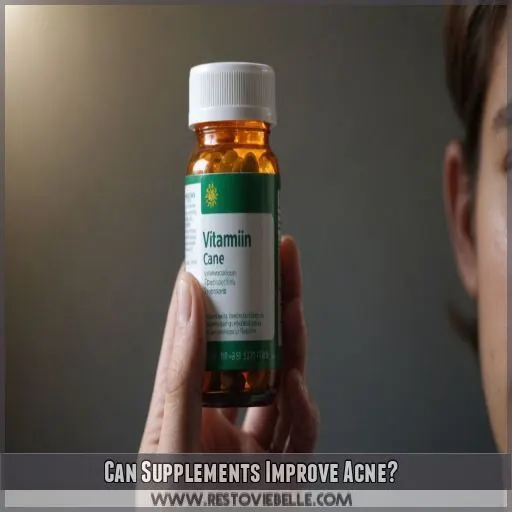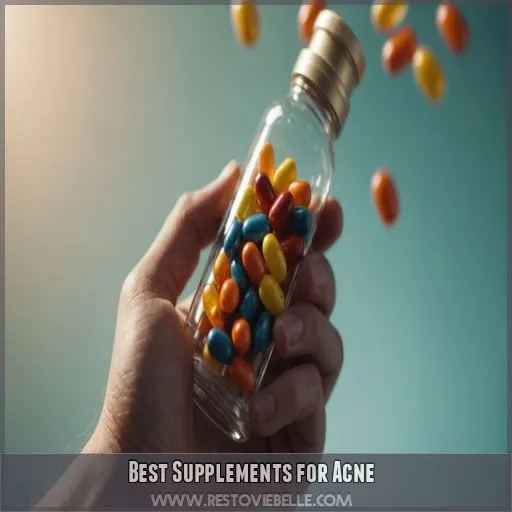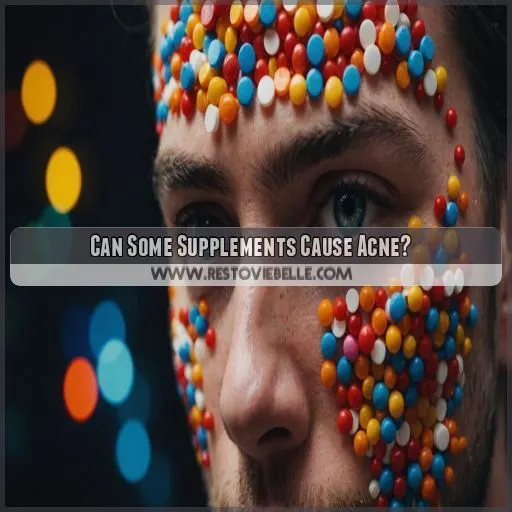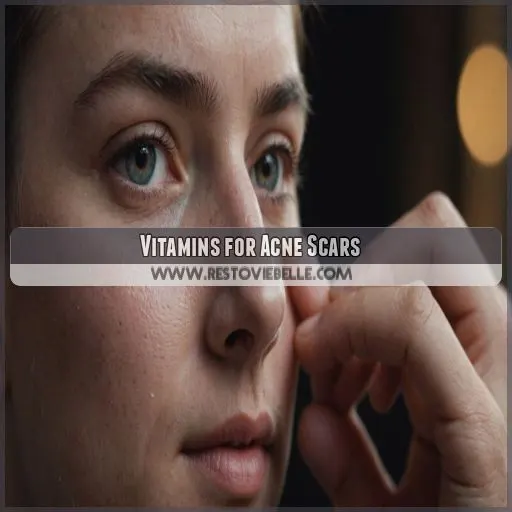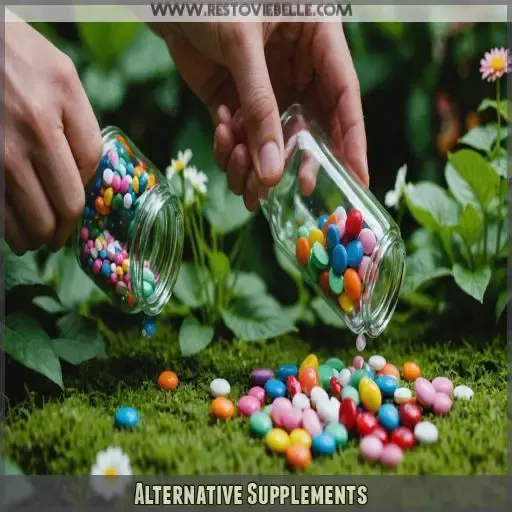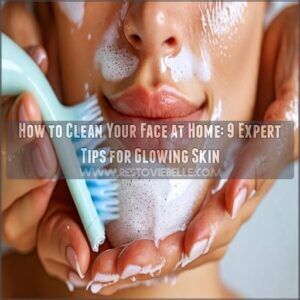This site is supported by our readers. We may earn a commission, at no cost to you, if you purchase through links.
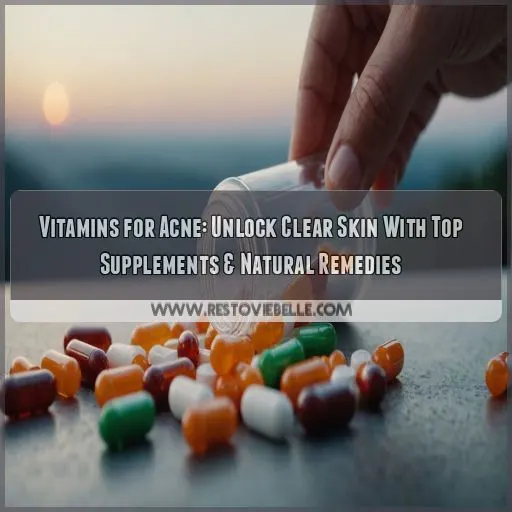 Got acne? Don’t worry, you’re not alone!
Got acne? Don’t worry, you’re not alone!
While it’s frustrating, research shows that vitamin deficiencies can contribute to those pesky pimples.
So, which vitamins can help?
For starters, Vitamin A can reduce acne severity by up to 50%, while Vitamin C boosts collagen production and fights free radicals.
Vitamin D regulates skin cell growth and reduces inflammation, and Vitamin E reduces redness and scarring.
And then there’s Niacinamide, which controls oil production and improves skin texture.
These vitamins for acne might just be the game-changer you need.
Want to learn how to harness their power for clearer skin?
Table Of Contents
- Key Takeaways
- Can Supplements Improve Acne?
- Best Supplements for Acne
- Can Some Supplements Cause Acne?
- Vitamins for Acne
- Vitamins for Acne Scars
- Alternative Supplements
- Takeaway
- Frequently Asked Questions (FAQs)
- Which vitamin is best for acne?
- Do vitamin supplements clear acne?
- Do vitamins help hormonal acne?
- What vitamin deficiency causes acne?
- How long does it take for supplements to work on acne?
- Are there any interactions between acne supplements and medications?
- Can I take multiple supplements for acne at once safely?
- Are there any age restrictions for taking acne supplements?
- Do I need a prescription for acne supplements or vitamins?
- Conclusion
Key Takeaways
- The pesky pimples on your face may be more than just a nuisance – they could be a sign that you’re lacking in some crucial vitamins! Research shows that vitamin A, vitamin C, vitamin D, and vitamin E can help alleviate acne symptoms and leave you glowing.
- If you’re struggling with acne, it’s essential to look beyond the surface (literally!). Supplements like green tea extract, maca root, and omega-3 fatty acids can work from the inside out to treat and prevent acne, reducing inflammation and repairing your skin barrier.
- Time to debunk the myth that vitamins are a magic bullet for acne. While they can undoubtedly help, a comprehensive treatment plan that includes a balanced diet, a healthy lifestyle, and professional guidance from a dermatologist is your best bet for tackling acne and achieving radiant skin.
- Be patient and consistent! Supplements can take around 4-8 weeks to show noticeable improvements in your skin. It’s also essential to remember that everyone’s skin is different, so what works for your BFF may not work for you – it’s crucial to experiment and find the unique combination that gets you glowing!
Can Supplements Improve Acne?
If you’re struggling with acne, you’re probably wondering if supplements can help improve your skin. From vitamins to natural remedies, there are several options that may help alleviate acne symptoms, so let’s explore the best supplements and vitamins for acne and how they work to give you the clear skin you desire .
How Supplements Work for Acne
Hey there, friend! So, you wanna know how supplements can help with acne? Well, let’s break it down! Supplements work from the inside out to treat and prevent acne. Here are 4 key ways they help:
- Micronutrients: Vitamins and minerals keep your skin healthy.
- Skin Barrier: Supplements help repair a weakened skin barrier.
- Inflammation: Antioxidants reduce inflammation.
- Vitamin Deficiencies: Supplements fill in the gaps.
The Link Between Diet and Acne
Consuming dairy, processed foods, and sugar can fuel inflammation, leading to acne.
On the other hand, a balanced diet rich in vitamin C, zinc, and omega-3 fatty acids can help regulate gut health and reduce inflammation.
The gut-skin axis is real, folks!
Niacinamide can also come to the rescue.
Supplements for Hormonal Acne
Struggling with hormonal acne? You’re not alone! Birth control can sometimes worsen acne, but there’s hope.
Supplements like zinc, probiotics, and maca root can help alleviate hormonal acne.
Research suggests maca root may regulate hormonal imbalances and inhibit cortisol.
Zinc is also a game-changer for PMS acne.
Probiotics support hormonal balance, while evening primrose oil and vitamin B3 also show promise.
Supplements for Acne Scars
Now that we’ve tackled hormonal acne, let’s talk about dealing with those pesky scars. You can use supplements to help reduce hyperpigmentation and promote skin healing. Here are three essential supplements for acne scars:
- Vitamin C: Boosts collagen production to smooth out scars and reduces inflammation.
- Vitamin E: Enhances skin hydration and protects against damage with its antioxidant properties.
- Selenium: Neutralizes free radicals to prevent further skin damage and promotes overall skin health.
Best Supplements for Acne
You’re probably wondering which supplements can help you achieve the clear skin of your dreams – and the good news is that there are many options to choose from! From green tea extract to zinc, we’ll break down the best supplements for acne that are backed by science and can help you say goodbye to breakouts for good.
Green Tea Extract
Let’s talk about Green Tea Extract, a superstar in the fight against acne.
| Green Tea Extract Benefits | Recommended Dosage | Potential Risks |
|---|---|---|
| Anti-inflammatory | 250-500mg daily | Interaction with |
| Antioxidant protection | blood thinners | |
| Improves skin cell turnover | Stomach upset |
Green tea extract and tea tree oil are both great for your skin, but green tea extract really shines when it comes to antioxidant protection and fighting inflammatory acne. It even helps reduce C. acnes bacteria, a major acne culprit! Just remember to talk to your doctor before adding it to your routine.
Maca Root
Let’s talk about maca root! This Peruvian plant may just be the ticket to balancing your hormones and soothing acne breakouts. Here are three reasons to give it a try:
- Hormone regulation: Maca root may help regulate hormonal imbalances that lead to acne.
- Anti-inflammatory properties: Maca root has been shown to reduce inflammation and improve skin health.
- Oral supplementation: Maca root can be taken orally to support skin health and function.
Magnesium and Calcium
These minerals work together to reduce inflammation, repair your skin barrier, and even help regulate sebum production.
A magnesium deficiency can lead to acne, so making sure you’re getting enough is important.
Consider a supplement or magnesium-rich foods like dark leafy greens to give your skin a boost.
Omega-3
You’re on a roll, tackling acne with the best supplements. Now, let’s talk Omega-3! This powerhouse reduces inflammation, a major acne culprit. Here are some key things to know:
- Omega-3 benefits: less inflammation, clearer skin
- Acne and diet: low Omega-3 intake is linked to acne
- Omega-3 sources: fatty fish, flaxseeds, chia seeds
- Omega-3 vs. Omega-6: find a balance to reduce inflammation
- Omega-3 dosage: consult a doctor for the right amount
Selenium
You’re probably familiar with selenium as an essential mineral for overall health, but did you know it’s also a powerhouse for skin health?
Selenium is an antioxidant that neutralizes free radicals, which damage your skin and lead to inflammation and acne.
This trace mineral is particularly effective in reducing the severity of skin diseases, including acne, by repairing and restoring your skin’s natural barrier.
Zinc for Acne
Let’s tackle Zinc for Acne! As a natural anti-inflammatory, zinc can help reduce breakouts and soothe your skin. Studies show Zinc supplements can improve acne, especially for mild-to-moderate cases. But, consult a doctor before taking zinc – too much can cause side effects like nausea or skin irritation. Typically, 15-20 mg of zinc per day is recommended.
Can Some Supplements Cause Acne?
You’re probably wondering if some supplements can actually cause acne – and the answer is yes. Certain supplements like vitamin B12 and iodine can trigger breakouts, so you really need to know what to avoid when trying to clear up your skin.
Vitamin B12 and Acne
The not-so-sunny side of supplements! While we’re all about harnessing their power, some can wreak havoc on our skin. Take Vitamin B12, for instance. Too much of it can cause inflammation and trigger breakouts. Here are some key things to keep in mind:
- Oral supplements can lead to side effects like skin infections and rashes.
- Topical B12 can irritate skin and cause acne-like symptoms.
- A vitamin deficiency is bad, but an excess can be just as damaging.
- Balance is key: B12 plays a role in skin cell regeneration, but too much can hinder renewal.
Iodine and Acne
So, you’re thinking about iodine and acne – let’s break it down! Iodine deficiency can worsen acne severity, but excessive iodine can trigger breakouts, especially on the face and upper trunk. If you’re considering iodine supplements, be cautious, as they can disrupt thyroid function and skin health. Topical iodine can also cause skin lesions and mess with your skin microbiome.
Natural Remedies and Herbal Medicines
You’re exploring natural remedies for acne. While some supplements can trigger breakouts, herbal treatments like milk thistle and tea tree oil can help. Milk thistle contains silymarin, an antioxidant that reduces oxidative stress and inflammation. Aloe vera also soothes and calms the skin. Always combine natural remedies with proven treatments, and consult a dermatologist before making any big changes.
Vitamins for Acne
You’re probably no stranger to the frustrating world of acne treatments, but have you considered the role vitamins play in achieving clear skin? From Vitamin A to Vitamin E, certain vitamins have been shown to help alleviate acne symptoms, and we’re about to break down the best ones for you.
Vitamin a for Acne
Want clearer skin? Vitamin A might be your secret weapon!
Topical retinol, a form of Vitamin A, can really make a difference.
Studies show it can cut acne by 50% compared to people who didn’t use it.
But listen up, taking Vitamin A pills can have side effects.
Stick to putting it on your skin, or talk to a dermatologist about a prescription-strength option.
Vitamin C for Acne
You’re probably aware that vitamin C is a powerhouse for fighting off colds, but did you know it’s also a game-changer for acne-prone skin? Here are just a few reasons why:
- Boosts collagen production to reduce scarring
- Fades hyperpigmentation for a more even complexion
- Fights free radicals to prevent skin cell damage
- Soothes skin irritation for a clearer, calmer face
Vitamin D for Acne
a deficiency can lead to increased acne severity. Boost your levels with sun exposure, dietary sources like fatty fish, or supplement intake. Here’s how Vitamin D affects acne:
| Vitamin D Effects | Acne Impact |
|---|---|
| Regulates skin cell growth | Reduces acne severity |
| Maintains skin barrier function | Prevents breakouts |
| Enhances skin hydration | Soothes dry skin |
| Supports immune system | Fights acne-causing bacteria |
| Reduces inflammation | Minimizes redness and swelling |
Vitamin E for Acne
You’re considering Vitamin E for acne – great choice! Vitamin E benefits include reducing redness, hyperpigmentation, and scarring. For best results, look for products with ceramides and omega-6 fatty acids. Healthy skin, here you come! Take Vitamin E orally or topically, but consult a doctor first. Start with a low dosage and choose products from reputable brands.
Vitamins for Acne Scars
You’re on the road to clear skin, and now it’s time to tackle those pesky acne scars! Vitamins can be your best friend in this fight, with Vitamin A, Vitamin C, Eicosapentaenoic Acid, and Niacinamide being some of the top contenders to help fade acne scars and leave your skin looking radiant.
Vitamin a for Acne Scars
You’re on the hunt for a solution to acne scars, and Vitamin A is a top contender! As a topical treatment, retinoids (like tretinoin) can really improve scars and skin texture after 24 weeks. But, beware: oral Vitamin A can have side effects. Stick to topical retinol for a safer, effective skin care regimen. Consult your dermatologist for the best approach!
Vitamin C for Acne Scars
You’re now tackling those pesky acne scars! Vitamin C is a powerhouse when it comes to collagen production, reducing inflammation, and giving your skin a radiant glow. Here are three fabulous benefits of Vitamin C for acne scars:
- Boosts collagen: Vitamin C helps produce collagen, making your skin look smoother and more youthful.
- Fades hyperpigmentation: Vitamin C’s antioxidant properties reduce dark spots, making your skin tone more even.
- Protects your skin: Vitamin C shields your skin from environmental stressors, preserving its elasticity and firmness.
Time to get clear, glowing skin!
Eicosapentaenoic Acid for Acne Scars
Let’s talk about Eicosapentaenoic Acid (EPA) for acne scars!
This omega-3 fatty acid is a game-changer.
Found in fish oil, EPA really helps reduce inflammation and promotes healing.
With its potent anti-inflammatory properties, EPA helps decrease clogged pores and skin oil production, making it an effective treatment for scarring.
Give fish oil a try and say goodbye to pesky acne scars!
Niacinamide for Acne Scars
Tackling acne scars can be a real challenge! Niacinamide, a form of vitamin B3, is here to help. By boosting collagen production, it can improve skin texture and reduce hyperpigmentation. Say goodbye to acne scars and hello to smoother skin! Use topical niacinamide products or take oral supplements to reap the benefits of this powerful antioxidant.
Alternative Supplements
When it comes to vitamins and supplements for acne, you’ll discover that some alternative options can be just as effective as traditional treatments. From milk thistle to probiotics, and omega-3 fatty acids, let’s explore how these natural remedies can help you achieve the clear skin you’ve been dreaming of.
Milk Thistle for Acne
Milk thistle is a popular supplement for acne.
The active compound silymarin supports liver health, which can help regulate hormones and reduce acne.
Milk thistle also provides antioxidant protection against external threats like UV damage.
However, be cautious with dosage, as excessive intake can have adverse effects.
When combined with other supplements, milk thistle can be a powerful tool in your acne-fighting arsenal.
Evening Primrose Oil for Acne
You’re on the hunt for natural remedies to clear your skin! Let’s chat about evening primrose oil for acne. This supplement is rich in gamma-linoleic acid (GLA), which reduces inflammation and promotes healthy skin. Here are some things to keep in mind:
- Evening primrose oil benefits: reduces inflammation, improves skin hydration, and regulates hormones
- Dosage recommendations: 1000-2000 mg per day
- Side effects: mild stomach upset, headaches, and rash
- Research studies: positive results in reducing acne symptoms and inflammation
- Best brands: look for high-quality, cold-pressed oil with a good GLA content
Probiotics for Acne
Now that we’ve explored the benefits of evening primrose oil, let’s talk probiotics! A healthy gut microbiome is key to reducing acne severity. Look for probiotics with strains like Lactobacillus acidophilus or Bifidobacterium bifidum, which support gut health. When choosing a probiotic, consider a dosage of 1-2 billion CFU (colony-forming units) per day to promote a balanced skin microbiome.
Omega-3 and Omega-6 Fatty Acids for Acne
Now that we’ve explored probiotics, let’s talk about omega-3 and omega-6 fatty acids for acne. These essential fatty acids help control skin oil production and reduce inflammation. Omega-3 sources like fish oil can decrease acne severity. Maintaining a balance between omega-3 and omega-6 fatty acids is key. Boost your omega-3 intake to reap its benefits for clearer skin.
Takeaway
You’re now equipped with a wealth of knowledge on vitamins and supplements for acne – but remember, you should talk to a dermatologist to figure out the best treatment plan for your skin. By combining the right vitamins and supplements with a healthy lifestyle and professional guidance, you can get clear, radiant skin and say goodbye to acne.
Consult a Dermatologist for Acne Treatment
Now that you’ve got the scoop on alternative supplements, it’s time to get personalized advice from a pro! Consulting a dermatologist can help you find the right acne treatments for your skin. Don’t be afraid to ask for recommendations – a specialist can provide a professional diagnosis and tailor a skincare plan just for you.
Engage With the Content
Now that you’ve got the lowdown on vitamins for acne, it’s your turn to share! What’s worked for you? What hasn’t? Spill the beans in the comments below! Your experience can help others tackle their own acne battles. And if you’ve still got questions, fire away! Let’s get the conversation started and figure out clear skin together!
Frequently Asked Questions (FAQs)
Which vitamin is best for acne?
Did you know that over 90% of people experience acne at some point in their lives? Don’t worry! You can regain control over your skin with Vitamin A, a powerhouse that hydrates, protects, and encourages skin cell turnover.
Do vitamin supplements clear acne?
You’re wondering if vitamin supplements can clear acne? While they can help, it’s important to know that vitamins are just one piece of the puzzle. A good plan that includes a healthy diet and skincare routine will give you the best results.
Do vitamins help hormonal acne?
You’re battling hormonal acne, and wondering if vitamins can be your knight in shining armor? Research suggests that zinc, probiotics, and maca root may help alleviate hormonal acne by regulating hormonal imbalances and inflammation.
What vitamin deficiency causes acne?
Hey, did you know a vitamin D deficiency can be a sneaky cause of acne? Research shows that people with acne, especially nodulocystic acne, often have lower levels of vitamin D. Worth checking your levels, isn’t it?
How long does it take for supplements to work on acne?
Did you know 85% of people experience acne at some point in their lives? Now, about those supplements – it can take around 4-8 weeks to see noticeable improvements in your skin, so be patient and consistent!
Are there any interactions between acne supplements and medications?
When considering supplements, it’s important to think about potential interactions with your medications.
You’ll want to watch out for interactions, especially if you’re taking supplements for acne.
Chat with your doctor about any potential clashes, especially if you’re on blood thinners, birth control, or antidepressants.
Make sure to discuss this with your healthcare provider to avoid any adverse effects.
Can I take multiple supplements for acne at once safely?
Consider Sarah, who takes zinc and vitamin A for acne. To make sure you’re safe when taking multiple supplements, talk to your doctor or dermatologist about potential interactions and the best dosages for your specific skin concerns.
Are there any age restrictions for taking acne supplements?
You’re considering acne supplements, but are there age restrictions? Generally, most supplements are safe for teenagers and adults, but you should talk to a dermatologist, especially if you’re under 18 or have pre-existing medical conditions.
Do I need a prescription for acne supplements or vitamins?
You don’t always need a prescription for acne supplements or vitamins, but it’s recommended to talk to a dermatologist to make sure you’re taking the right ones for your skin type and condition. They can help you figure out the best way to treat your skin.
Conclusion
Feeling frustrated with acne?
You’re not alone!
Leveraging vitamins for acne can be a total game-changer.
By boosting your intake of Vitamin A, C, D, and E, you can reduce acne severity, inflammation, and scarring.
Combine these supplements with a balanced diet and healthy lifestyle, and you’ll be on your way to clearer skin.

